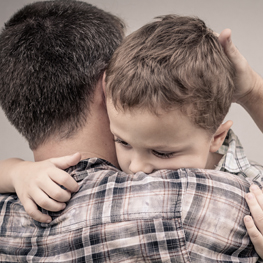
Learning that you, your spouse, or another family member suffers from an incurable illness or a serious, possibly fatal injury is devastating. After the initial shock, you may wonder how to break the news to your children. “What we try and tell parents is that we can’t fix things that are heartbreaking, but we can make them easier to understand,” says Heather Kinney, CCLS, CPST, a senior child life specialist at Children’s Hospital of Richmond at Virginia Commonwealth University Health System (VCU).
How much to tell?
While it’s normal to show sadness when sharing the news with your children, take time to process the information yourself before talking to your kids. When you do go to break the news, you may wish to have another adult present for emotional support. Kinney suggests starting the conversation with: “I have something really important that we need to talk about. Do you think you are ready to listen?”
“A good rule of thumb is to be as honest as you can while taking into consideration where the child is developmentally,” says Crista Donewar, Ph.D., pediatric psychologist, Children’s Health Children’s Medical Center in Dallas. Decide whether to tell siblings together or separately. Consider their ages, personalities, the nature of the situation and what feels right to you.
Most of all “guard against trying to shield kids from information because what they’re imagining can be worse than reality,” says Allison DeLaney, chaplain and a hospice house bereavement coordinator. “What’s surprising is that kids often do better than the adults if given the chance.”
Managing questions
Some children ask many questions while others won’t ask any right away. “Some kids don’t want to know. That’s fine, too. That’s that child’s choice and way of coping, but keeping them out of the conversation without asking them is harmful,” says DeLaney. You may find that “they dismiss the news the first time and then come back and have a few questions and need another explanation,” explains Donewar. And don’t be surprised if your kids come back and ask you the same questions over again as the situation sinks in.
So what kinds of questions should you expect?
“The first thing kids want to know is, ‘Are you going to die?’” says Kinney. “Kids look to their parents to tell them the truth. If the first thing you tell them is a lie, how do they know to trust you again? We all deserve the truth about the people we love.”
Kids typically wonder how the information will affect them. For example, they might worry that ‘If mom dies, what if something happens to dad? Who will take care of me?’ Help lessen your child’s anxieties by explaining that your family has a plan in place to care for them, no matter what.
They may also privately wonder, ‘Did I do something that caused this to happen?’ “Assure them that it’s not their fault,” says DeLaney.
Allow them to help
If your child wants to be involved in some way to help care for their loved one, suggest practical ideas like getting a drink of water and putting it on the bedside table, retrieving a box of kleenex, or quietly drawing a picture, suggests DeLaney.
Seek support
Your child may need to talk to someone else about their feelings. Connect with one of their close friend’s parents or tap available community resources. If grief goes unresolved, a child, especially an adolescent, may act out through boundary-pushing and risk-taking. Clue your child’s paediatrician and school teachers in on what has happened.
Also, surround yourself with your own adult support network and resources for comfort and emotional support. “Oversharing or relying on kids to comfort you causes them a lot of stress and additional worry,” advises Donewar.
Check online for area grief support camps for kids, art therapy, support groups, and mental health professionals. By providing resources to support the healing process, you and your children will feel less alone and better able to manage your stress. For more information, check out How to Help Children Through a Parent’s Serious Illness by Kathleen McCue.
Legacy-building activities
Help your child build positive memories with a dying loved one by creating legacy items:
Christa is a freelance journalist, author, and mom of two boys. Her latest book is Happy, Healthy & Hyperconnected: Raise a Thoughtful Communicator in a Digital World.
Calgary’s Child Magazine © 2024 Calgary’s Child